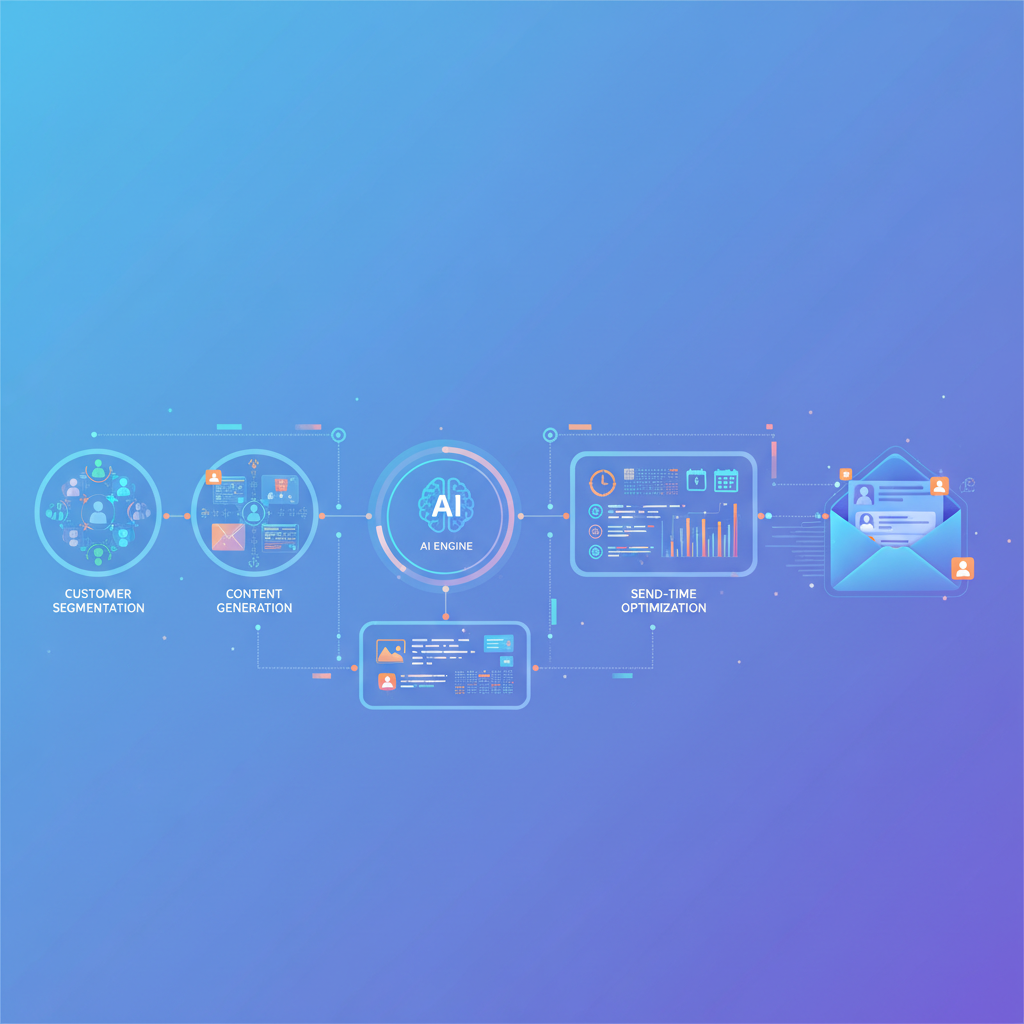In my 25+ years navigating the exhilarating currents of technology and leadership, I’ve witnessed countless "next big things" emerge, some fizzling out, others reshaping industries entirely. Today, as I observe the rapid ascent of AI, particularly in spaces like marketing, I can say with conviction that we are not just on the cusp of a change; we are in the midst of a full-blown revolution. For founders and leaders like us, understanding this shift isn’t optional; it’s foundational to building scalable, future-ready companies.
Email marketing, often perceived as an "old-school" digital channel, is ironically becoming one of the most exciting battlegrounds for AI innovation. The days of generic, one-size-fits-all newsletters are swiftly fading, replaced by an era where every email feels like a personal conversation, thanks to the transformative power of AI agents.
The Core Benefits: A Triad of Transformation
When I think about what truly separates successful businesses in dynamic markets — be it the bustling tech hubs of Bengaluru, the strategic corridors of Dubai, or the mature markets of Europe and the United States — it often boils down to efficiency and relevance. AI agents in email marketing excel at both, delivering three paramount benefits:
Hyper-Personalization at Scale
Gone are the days when "Dear [First Name]" was considered personalized. AI agents delve into vast datasets — purchase history, browsing behavior, demographics, even sentiment analysis from past interactions — to craft messages so tailored they feel bespoke. Imagine a customer in London receiving an email about a product they viewed minutes ago, complete with a localized offer and imagery that resonates with their cultural context. This isn't science fiction; it's current reality.
AI models can predict future preferences, recommend complementary products, and even adjust the tone of the message to match a recipient’s past engagement patterns, leading to significantly higher open and conversion rates.
Intelligent Automation and Efficiency
For any growing business, resource optimization is key. AI agents automate repetitive, time-consuming tasks that previously bogged down marketing teams. This includes everything from segmenting audiences and A/B testing subject lines to scheduling send times for optimal engagement across different time zones — a crucial factor when targeting audiences from New York to Sydney, or Mumbai to Berlin.
🌟 Personal Story: I recall an early venture where we spent countless hours manually segmenting customer lists and crafting separate email campaigns. The sheer effort was immense, and the results, frankly, were often hit or miss. Today, watching AI platforms automate these complex tasks in minutes — and with far greater precision — truly highlights the monumental leap in operational efficiency. It frees up our human talent for creative strategy, not repetitive drudgery.
Performance Optimization and Predictive Analytics
Beyond automation, AI agents continuously learn and adapt. They analyze campaign performance in real-time, identifying patterns and making data-driven recommendations to improve open rates, click-through rates, and ultimately, conversions. This iterative learning process means your campaigns get smarter with every send.
📊 By the Numbers: Companies leveraging AI for email marketing have reported up to a 20% increase in open rates and a staggering 30% boost in click-through rates, translating directly to higher ROI.
Practical Applications in Modern Campaigns
So, how do these theoretical benefits translate into tangible marketing actions? Here are a few ways AI agents are being put to work:
- Dynamic Content Generation: AI can write subject lines, email copy, and even suggest imagery based on recipient data.
- Predictive Segmentation: Automatically group users based on predicted behavior (e.g., likelihood to churn, next purchase).
- Send Time Optimization: Determine the "perfect" time to send an email for each individual subscriber, wherever they are in the world.
- Automated A/B Testing: Constantly test and optimize elements like calls-to-action, layout, and offers without manual intervention.
- Personalized Product Recommendations: Leverage past interactions to suggest highly relevant products or content.
Implementing AI: A Marketer’s Blueprint
The path to integrating AI into your email strategy isn’t about replacing human marketers; it’s about augmenting their capabilities. As I often tell emerging leaders in India and Australia, the goal is to build smarter systems that free up human creativity.
🚀 Action Step: Start with a clear objective. Are you aiming to increase open rates, boost conversions, or reduce churn? Define your KPIs first, then explore AI solutions that align.
You’ll need to ensure you have clean, structured data — the "fuel" for any AI agent. Begin with smaller, manageable AI-driven tests, then scale up. Crucially, don’t forget the human oversight; AI is a powerful tool, but it needs strategic direction.
"AI doesn't just optimize marketing; it redefines the very relationship between brands and customers, turning transactions into truly personalized interactions."
— Dr. Anya Sharma, Head of Digital Innovation, Global Marketing Firm
Prominent Platforms and Tools Leveraging AI
The market is flourishing with platforms that have deeply integrated AI capabilities into their email marketing suites. Here are a few that stand out, offering different facets of AI-driven power:

- Braze: Known for its comprehensive customer engagement platform, Braze uses AI to orchestrate cross-channel campaigns, including intelligent email personalization and journey optimization.
- Optimove: Specializes in "customer-led marketing," using AI to predict customer behavior and micro-segment audiences for highly effective, personalized campaigns.
- Iterable: Offers AI-powered segmentation, send-time optimization, and dynamic content — allowing marketers to deliver unique experiences at scale.
- Persado: Focuses specifically on AI-generated language, optimizing copy for emotional resonance and performance in emails, ads, and more.
- ActiveCampaign: While not a purely AI platform, it has robust automation features that, when combined with its machine learning capabilities for predictive sending and win-back campaigns, make it a powerful tool for SMBs and growing enterprises.
💡 Pro Tip: Don't just look at "AI features." Evaluate how seamlessly these tools integrate with your existing CRM and data infrastructure. A powerful AI tool is only as good as the data it can access and the ecosystem it operates within.
⚠️ Important: While AI offers immense benefits, remember the ethical implications of data privacy and transparent communication. Ensure your AI-driven strategies comply with regulations like GDPR and CCPA, which are globally relevant, from Europe to the United States.
The Future is Smart, Personal, and Automated
As I reflect on the journey from traditional marketing to the current AI-powered landscape, I’m convinced that the future of email marketing isn’t just about sending emails; it’s about fostering genuinely meaningful connections. AI agents aren’t here to diminish the human touch but to amplify it, allowing us to deliver unparalleled personalization at a scale previously unimaginable.
💭 Think About This: How can your organization leverage AI to move beyond mere transactions and build deeper, more authentic relationships with your customers through email?
🎯 Key Takeaways:
- AI agents are fundamentally changing email marketing by enabling hyper-personalization, intelligent automation, and continuous performance optimization.
- Practical applications range from dynamic content and predictive segmentation to optimal send-time and A/B testing.
- Marketers should focus on clean data, clear KPIs, and strategic human oversight when implementing AI solutions.
- Platforms like Braze, Optimove, Iterable, Persado, and ActiveCampaign are leading the charge in AI-driven email marketing.
- Ethical considerations around data privacy and transparency remain paramount for responsible AI adoption.
Embracing AI isn't just about adopting new tools; it's about fostering a mindset of continuous innovation and strategic growth. For leaders across India, the United States, Europe, the Middle East, and Australia, the message is clear: the future of marketing is intelligent, deeply personal, and powered by AI. Let’s lead this transformation — not just observe it. What steps will you take today to integrate AI into your email strategy and build those "smarter systems" I often speak of?









